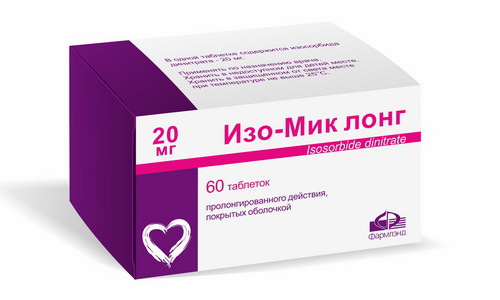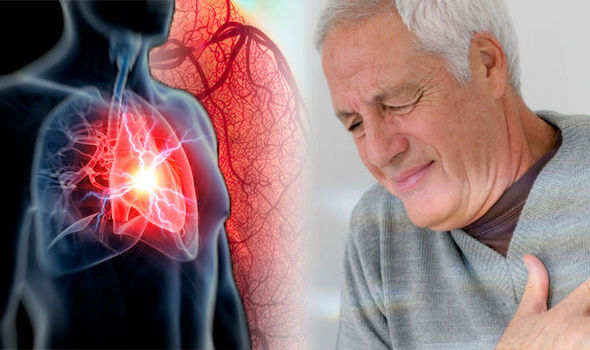Organic nitrates have been successfully used for more than 100 years in coronary heart disease. They are prescribed in order to reduce pain from heart attack and angina pectoris, which arise as a result of oxygen starvation of the heart. You can read more about the classification and mechanism of action of nitrates, indications and contraindications to their use in this article.
History
Nitrates appeared in 1879. The doctor and scientist Murrell published the results of the study, which showed that more than 90% of the subjects had anginal pain in the heart decreased after taking 1% nitroglycerin solution. This discovery soon began to be used by many doctors around the world. Nitroglycerin itself was discovered in 1846, but only after several decades it began to be used in medicine. The action of the substance is based on the release of nitric oxide from the cells, which relaxes blood vessels and promotes a better supply of oxygen to internal organs.

Initially, nitrates were used only in liquid form, which was very inconvenient. Murrell then turned to the chemist Martindale, who made nitroglycerin in the form of small granules in a chocolate shell. This form of medicine was in demand among patients, and doctors prescribed the drug to drink until the pain in the heart disappears. Naturally, this caused some difficulties: it was not clear what dose the patient required and what would happen if it was increased or decreased. But in 1925, cardiologists began to use capsules with a fixed dosage, and somewhat later an alcohol solution and sublingual tablets appeared. Unfortunately, the effect of nitroglycerin did not last for the right amount of time, so tablets had to be taken too often. In view of this, scientists began to develop a new formula of nitrates, which led to the emergence of drugs based on isosorbide mononitrate. Preparations based on it had the same effect: they dilated blood vessels and relieved pain in the heart. But besides this, they acted for a long period of time.
Classification
There are several types of nitrates on the market today. Short-acting drugs are prescribed for short-term effects on the body, for example, when it is necessary to alleviate the pain of myocardial infarction. Long-acting nitrates are prescribed for preventive purposes. Different drugs and dosage forms:
- Pills under the tongue.
- In the form of adhesives for skin application.
- In the form of an aerosol.
- In the form of injections.
The effect of the drug on the body and the duration of the therapeutic effect, primarily depends on the type of nitrate. There are currently several different compounds in medicine:
- Isosorbide dinitrate is an odorless and tasteless substance poorly soluble in water. This prolonged action nitrate is usually prescribed for congestive heart failure and esophageal spasm. This drug is listed in the List of Essential Medicines by the World Health Organization as the most effective and safe agent for the body. Isosorbide dinitrate is an active component of the following drugs: Cardicet, Cardix, Nitrosorbide, Isoket.
- Glyceryl trinitrate. They produce drugs with such a composition as short-acting or long-acting. Such drugs include the well-known Nitroglycerin, as well as Trinitrolong, Sustonit. "Nitroglycerin" is the most famous medicine used to eliminate anginal pain. Despite the fact that this drug is more than 40 years old, it remains relevant to this day. Usually it is used in cases where you need to briefly expand the patient's blood vessels. The action of "Nitroglycerin" ends after 30 minutes. But there are also prolonged forms of medication that continue to affect the body for 6 or more hours.
- Isosorbide mononitrate is distinguished by its high bioavailability: more than 95% of the drug is absorbed into the blood, continuing to act up to 12 hours. Isosorbide mononitrate also has one more plus: its side effects are less pronounced than that of Nitroglycerin. The following products can be purchased at the pharmacy based on it: Izomonat, Efoks Long, Olikard, etc.
The action of organic nitrates
Many patients are interested in what effect nitrates have on the body. Among the therapeutic effects of these substances, the following can be distinguished:
- Reduced heart load. With narrowed vessels, the heart muscle is forced to work with a double load, as it tries to compensate for the insufficient blood supply to the body. By dilating blood vessels, vasodilators remove excessive diastolic pressure and reduce heart rate. The effect of nitrates on the heart is difficult to overestimate.
- Decreased platelet adhesion. The mechanism of the vasodilating effect of nitrates and their disaggregant effect is achieved due to the fact that these substances secrete prostacyclin, which affects the blood formula of a person. That is why organic nitrates can be used to prevent thrombosis and blockage of blood vessels.
- The antianginal effect is associated with vasodilation. As a result, the supply of oxygen to the heart and blood vessels improves and the load on them decreases. The mechanism of the antianginal action of nitrates is based on an increase in the content of nitric oxide in the blood.
- The fibrinolytic effect of organic nitrates is based on a decrease in platelet viscosity and the release of plasminogen activator. In the long run, these drugs reduce the risk of vascular obstruction.
- The expansion of the lumen of arterioles has a positive effect on human well-being. Due to this effect, there is an increase in cardiac output and an improvement in myocardial oxygen supply, which indirectly reduces the likelihood of a heart attack.
- Cardiac muscle ischemia is prevented. This mechanism of action of organic nitrates on the body is based on the expansion of blood vessels and an increase in the flow of oxygen to the heart.
The therapeutic effect of the use of organic nitrates is difficult to overestimate. Therefore, these medicines are used by thousands of people around the world.
The mechanism of action of nitrates on the body
Particularly curious people want to know what the healing effects of organic nitrates are based on. The thing is the molecule of the substance itself, which has an amazing effect on the body. The mechanism of action of organic nitrates is based on the release of nitric oxide molecules in the body. After the patient takes a medicine based on these organic substances, a whole chain of actions unfolds in his body. Nitrate acts on vascular smooth muscle cells, as a result of which NO molecules are released. The action of nitrates on the vessels is to relax their walls, as well as the walls of some internal organs (heart, esophagus).

In addition, nitrates improve the blood supply to the body by blocking coronary constriction reflexes in the brain. As a result, control over the vessels and heart is weakened and the likelihood of spontaneous narrowing is reduced. These two effects increase the overall well-being of a person: the load on the heart decreases, the myocardium receives more oxygen and as a result, the heart muscle has to perform fewer strokes in order to provide the body with the necessary amount of oxygen. Dilation of venous vessels allows blood to freely enter the heart, saturating it and improving its function.
But this is not all the mechanisms of action of nitrates. In addition, they positively affect the electrolyte balance and the activity of respiratory enzymes. These substances reduce pressure in the pulmonary circulation and prevent the development of arrhythmias.
Indications for use
Indications and mechanism of action of nitrates are closely interrelated. Under what pathological conditions are these drugs prescribed?
- Coronary artery disease. Usually in the acute stage. Nitrates help eliminate left ventricular failure and increase the blood supply to the heart. As a result of the use of these organic substances, a decrease in ischemia and a decrease in blood pressure are observed.
- Acute and chronic heart failure. It is usually observed together with high blood pressure and insufficient supply of the heart myocardium. Nitrates can neutralize these conditions.
- Pulmonary edema and congestion in them. Since nitrates relax not only the walls of blood vessels, but also generally have a relaxing effect on organs, their use in some lung diseases can improve the patient's condition.
- Prevention of cardiac ischemia and myocardial infarction. In the case when the patient has prerequisites for heart disease, the use of nitrates can make the prognosis of treatment more optimistic.
A number of indications for the use of nitrates makes them indispensable in the treatment of diseases of the cardiovascular system. Not for nothing that Nitroglycerin will be included in the WHO List of Essential Medicines. However, the appointment of drugs and dosage calculation should only be done by a doctor, as these drugs have a number of contraindications and side effects.
Side effects
Reception of nitrates can not pass for an organism without a trace. The same therapeutic effect of vasodilation, which positively affects the heart muscle and blood supply to the brain, can lead to dizziness or even loss of consciousness. Therefore, when taking organic nitrates, it is important to understand what side effects can be expected from them. It:
- Headache.
- Dizziness and weakness.
- Tachycardia and bradycardia.
- Addiction to drugs.
- Exacerbation of glaucoma.
- Dermatitis.
Nitrates should be taken with caution in patients with low blood pressure. For those who already have it, Nitroglycerin can lower it even more. Due to an increase in blood supply to the brain, an oxygen “overabundance” may occur, as a result of which people experience nausea, headaches and vomiting. Often in patients taking organic nitrates, an increase in the pulse rate is also detected due to the activation of the sympathetic nervous system. That is why, after taking nitrate-based medications, the patient is advised to lie down for some time, since a sharp rise can worsen the situation.

Another significant side effect of such drugs is getting used to them after a certain period of time. The mechanism of this phenomenon has not yet been established, but the human body develops resistance over time and it needs more and more large doses of nitrates. After drug withdrawal, there may be a weaning syndrome: patients often have angina pectoris and hypoxia. These conditions can threaten health, so the dose of nitrates is gradually reduced under the supervision of a doctor. But getting used to them can be avoided. To do this, follow a few simple rules:
- Take a break from time to time (1-2 weeks will be enough).
- The interval between medications should be at least 8-12 hours.
Contraindications
The mechanism of action of organic nitrates and indications for their use prove that it is worth drinking such medications only after the appointment of a doctor. Before prescribing nitrates to the patient, the specialist will find out his anamnesis and related diseases. The fact is that there are a number of contraindications in which the use of "Nitroglycerin" and similar drugs is impossible:
- Low blood pressure (less than 90 mmHg).
- Myocardial infarction, which is accompanied by shock.
- Head injuries.
- Increased ICP.
- Pulmonary edema of a toxic form.
- Anemia of the third degree.
- Sensitivity to the components of the drug.
- Glaucoma.
- Acute hypoxia of the brain.
- Pregnancy in the first trimester.
- Breast-feeding.
The use of nitrates in the second and third trimester of pregnancy is possible only if there are serious indications. The drug should be taken only under the strict supervision of a doctor who monitors the condition of the mother and child. Appointment to nursing mothers is also impossible: nitrates penetrate the baby's body through milk and can have a devastating effect on him. Therefore, it is important either to stop breastfeeding, or to find a safer alternative.
Interaction with other medicines
The action of nitrates on the heart is based on the antianginal mechanism. But there are a number of drugs that, together with nitroglycerin and its derivatives, lower blood pressure, creating a threat to the patient’s health. What are these drugs?
- Mucolytic drugs (Lazolvan, Ambrobene).
- Some anticonvulsants (Phenobarbital).
- Tricyclic antidepressants.
- Medications that lower blood pressure.
- Narcotic analgesics.
It also negatively affects the effectiveness of nitrates and alcohol. The combination of these two substances not only does not give the desired effect, but also has a detrimental effect on the liver. There is another category of drugs that reduce the effectiveness of nitrates. These include the following compounds:
- "Histamine".
- "Acetylcholine."
- Norepinephrine.
In the treatment of coronary heart disease, doctors usually use nitrates in combination with beta-blockers and calcium channel blockers to prevent tachycardia.
Expert Advice
In order to receive the appointment of a course of nitrates, you need to contact a competent specialist. As a rule, this is an ordinary therapist or cardiologist. After prescribing the drug, further monitoring of the patient's condition is required. It allows you to identify side effects in time and adjust the dose or change the drug. Some factors may indicate the effectiveness of treatment:
- The patient tolerates physical activity better.
- The number of angina attacks is reduced.
- Systolic blood pressure decreases to 15-25 mm RT. Art. at rest.
In some cases, to control the effectiveness of treatment, the patient is subjected to a little physical exertion and watch how the body copes with it. This method clearly shows how effective the treatment is.
Before taking the medicine, experts recommend that you carefully read the instructions for use and understand what is the mechanism of action of nitrates in angina pectoris before starting their use. Exceeding the dose can be detrimental to health, as well as a sharp withdrawal of the drug. It is necessary to reduce the dose of the medicine gradually to give the body time to get used to the changes. You can get all the recommendations from your doctor, because it is extremely important that the dosage of the drug and the duration of the drug be selected correctly, taking into account the severity of the disease and the patient's condition.
Opinions
The reviews of patients who underwent nitrate therapy clearly make it clear that, when used correctly, they help to cope with cardiac ischemia and vascular spasms. People often use "Nitroglycerin" for angina attacks, it helps to quickly eliminate discomfort. Long-term therapy also bears fruit: patients begin to feel better, their pressure decreases and more strength appears. But there are also frequent cases of side effects. With the wrong dosage or in combination with some drugs, patients experience headaches and dizziness. As a rule, these effects disappear soon after the withdrawal of nitrates or dose adjustment.
Often people ask about the mechanism of action of silver nitrate. The fact is that this substance has nothing to do with organic nitrates, but is a salt of a silver metal and nitric acid. This compound is used for stomach ulcers and various skin inflammations, but not for the treatment of coronary heart disease.
Summary
The competent use of nitrates prescribed by a qualified doctor can significantly improve the patient's quality of life. You need to understand that the features of taking such drugs have a great influence on the final effectiveness of the course, so it is important to carefully study the mechanism of the antianginal action of nitrates and indications for their use, as well as find a good specialist.